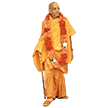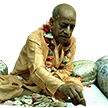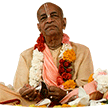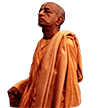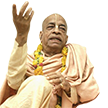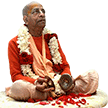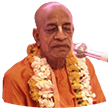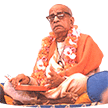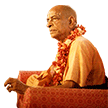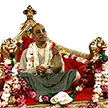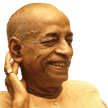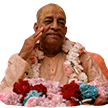Vaisnava - an essential subject: Difference between revisions
(Created page with "Category:Essential Subjects <!----------------------- edit below this line -----------------------> <!------------------------ begin introduction text below --------------...") |
(Vanibot #0041: Moves Choose Another box to the end) |
||
| Line 2: | Line 2: | ||
<!----------------------- edit below this line -----------------------> | <!----------------------- edit below this line -----------------------> | ||
<!------------------------ begin introduction text below ------------------------> | <!------------------------ begin introduction text below ------------------------> | ||
TVaiṣṇava means Viṣṇu is the Supreme Personality of Godhead and one who loves Viṣṇu or loves God, he is Vaiṣṇava. So Hinduism is not like that. Present conception of Hinduism, they have got so many demigods. Demigods are there in the Vedas, but demigod worshipers, they are all materialistic persons. The Vaiṣṇava's are always para-duḥkha-duḥkhī. Vaiṣṇava should be duḥkhī for others. Vaiṣṇava personally, he has no duḥkha. That is Prahlāda Mahārāja says, naivodhvije para duratyay vaitaranyas tvad-viya-gayana-mahamrta-magna-cittaḥ, soce tato vimukh-cetasa. | |||
Srila Prabhupada's books, lectures, conversations and letters offer a comprehensive presentation of this essential subject as seen in the Vaniquotes '''[[Vaniquotes:Category:Vaisnava|Vaisnava]]''' category. An introduction from his books is given below in the following | Srila Prabhupada's books, lectures, conversations and letters offer a comprehensive presentation of this essential subject as seen in the Vaniquotes '''[[Vaniquotes:Category:Vaisnava|Vaisnava]]''' category. An introduction from his books is given below in the following 12 quotes. | ||
<!-------- end introduction text and don't touch next three lines ---------> | <!-------- end introduction text and don't touch next three lines ---------> | ||
== Quotes from Srila Prabhupada's books == | == Quotes from Srila Prabhupada's books == | ||
<!----------------- edit quote boxes below this line -----------------> | <!----------------- edit quote boxes below this line -----------------> | ||
{{VaniQuotebox| | {{VaniQuotebox|A bhajananandi is not interested in preaching work, but a gosthy-anandi is interested in spreading Krsna consciousness to benefit the people and increase the number of Vaisnavas|A bhajanānandī is not interested in preaching work, but a goṣṭhy-ānandī is interested in spreading Kṛṣṇa consciousness to benefit the people and increase the number of Vaiṣṇavas. A Vaiṣṇava is understood to be above the position of a brāhmaṇa. As a preacher, he should be recognized as a brāhmaṇa; otherwise there may be a misunderstanding of his position as a Vaiṣṇava. '''(Caitanya-caritāmṛta, Madhya-līlā 8.128)'''}} | ||
{{VaniQuotebox| | {{VaniQuotebox|A bona fide spiritual master, under the guidance of authorities, can turn anyone to the Vaisnava cult so that naturally he may come to the topmost position of a brahmana|Therein he has clearly stated that any person who is properly initiated into the Vaiṣṇava cult certainly becomes a brāhmaṇa, as much as the metal known as kaṁsa (bell metal) is turned into gold by the mixture of mercury. A bona fide spiritual master, under the guidance of authorities, can turn anyone to the Vaiṣṇava cult so that naturally he may come to the topmost position of a brāhmaṇa. '''(Nectar of Devotion, Chapter 5)'''}} | ||
{{VaniQuotebox| | {{VaniQuotebox|A brahmana who is well versed in Vedic knowledge and fully conversant with transcendental matters becomes a representative of the Supreme Personality of Godhead, and therefore one should worship such a brahmana or Vaisnava|Every living entity is an individual person, and the Supreme Personality of Godhead, Kṛṣṇa, is the Supreme Person. A brāhmaṇa who is well versed in Vedic knowledge and fully conversant with transcendental matters becomes a representative of the Supreme Personality of Godhead, and therefore one should worship such a brāhmaṇa or Vaiṣṇava. A Vaiṣṇava is superior to a brāhmaṇa because whereas a brāhmaṇa knows that he is Brahman, not matter, a Vaiṣṇava knows that he is not only Brahman but also an eternal servant of the Supreme Brahman. '''(Śrīmad-Bhāgavatam 7.14.41)'''}} | ||
{{VaniQuotebox| | {{VaniQuotebox|A dog always keeps himself at his master's door and does not allow any person unfavorable to the master to enter. Similarly, one should engage in the service of a Vaisnava and try to please him in every respect|A dog always keeps himself at his master's door and does not allow any person unfavorable to the master to enter. Similarly, one should engage in the service of a Vaiṣṇava and try to please him in every respect. Unless one does so, he does not make spiritual advancement. Apart from spiritual advancement, in the material world if one does not develop his qualities in goodness, he cannot be promoted to the higher planetary system. '''(Śrīmad-Bhāgavatam 4.29.30-31)'''}} | ||
{{VaniQuotebox| | {{VaniQuotebox|A false acarya may try to override a Vaisnava by a high-court decision, but Bhaktivinoda Thakura says that he is nothing but a disciple of Kali-yuga|Mundane votes have no jurisdiction to elect a Vaiṣṇava ācārya. A Vaiṣṇava ācārya is self-effulgent, and there is no need for any court judgment. A false ācārya may try to override a Vaiṣṇava by a high-court decision, but Bhaktivinoda Ṭhākura says that he is nothing but a disciple of Kali-yuga. '''(Caitanya-caritāmṛta, Madhya-līlā 1.220)'''}} | ||
{{VaniQuotebox| | {{VaniQuotebox|A devotee must therefore be completely free from envy, especially of other devotees. To envy other devotees is a great offense, a vaisnava-aparadha|A devotee must therefore be completely free from envy, especially of other devotees. To envy other devotees is a great offense, a vaiṣṇava-aparādha. A devotee who constantly engages in hearing and chanting (śravaṇa-kīrtana) is certainly freed from the disease of envy, and thus he becomes eligible to go back home, back to Godhead. '''(Śrīmad-Bhāgavatam 9.11.23)'''}} | ||
{{VaniQuotebox| | {{VaniQuotebox|A genuine brahmana or Vaisnava therefore depends eternally on the conclusion of the Vedas or Vedic versions presented by the Supreme Personality of Godhead Himself|A genuine brāhmaṇa or Vaiṣṇava therefore depends eternally on the conclusion of the Vedas or Vedic versions presented by the Supreme Personality of Godhead Himself. Only from Vedic knowledge can we understand the actual position of the Absolute Truth, who, as described in Śrīmad-Bhāgavatam, is manifested in three features—namely impersonal Brahman, localized Paramātmā and, at last, the Supreme Personality of Godhead. '''(Śrīmad-Bhāgavatam 4.21.42)'''}} | ||
{{VaniQuotebox| | {{VaniQuotebox|Because a Vaisnava fully takes shelter of the Supreme Personality of Godhead, he personally has no problems, but because he is compassionate toward the fallen, conditioned souls, he is always thinking of plans to save them from their hellish life|This is the problem faced by a Vaiṣṇava. Because a Vaiṣṇava fully takes shelter of the Supreme Personality of Godhead, he personally has no problems, but because he is compassionate toward the fallen, conditioned souls, he is always thinking of plans to save them from their hellish life in this body and the next. '''(Śrīmad-Bhāgavatam 6.1.6)'''}} | ||
{{VaniQuotebox|Because the brahmanas and Vaisnavas are always directed by the Supreme Personality of Godhead, they are not greedy for material wealth. What is absolutely necessary they possess, but they do not want an expanded kingdom|Brāhmaṇas are always enlightened by the Supreme Personality of Godhead within the heart (sarvasya cāhaṁ hṛdi sanniviṣṭo mattaḥ smṛtir jñānam apohanaṁ ca (BG 15.15)). And because the brāhmaṇas and Vaiṣṇavas are always directed by the Supreme Personality of Godhead, they are not greedy for material wealth. What is absolutely necessary they possess, but they do not want an expanded kingdom. '''(Śrīmad-Bhāgavatam 9.11.6)'''}} | |||
{{VaniQuotebox|Bhaktivinoda Thakura has said that a Vaisnava is he who has helped others become Vaisnavas|Formerly, all activities were performed in connection with Viṣṇu, but after Satya-yuga there were symptoms of disrespectful dealings among Vaiṣṇavas. Śrīla Bhaktivinoda Ṭhākura has said that a Vaiṣṇava is he who has helped others become Vaiṣṇavas. An example of one who has converted many others into Vaiṣṇavas is Nārada Muni. A powerful Vaiṣṇava who has converted others into Vaiṣṇavas is to be worshiped, but because of material contamination, sometimes such an exalted Vaiṣṇava is disrespected by other, minor Vaiṣṇavas. '''(Śrīmad-Bhāgavatam 7.14.39)'''}} | |||
{{VaniQuotebox|Brahmaji, Lord Siva, Srimati Laksmiji and the four Kumaras (Sanaka, Sanatana, etc.) are leaders of the four desireless Vaisnava sampradayas|Lord Śiva are specifically cited here because Brahmājī, Lord Śiva, Śrīmatī Lakṣmījī and the four Kumāras (Sanaka, Sanātana, etc.) are leaders of the four desireless Vaiṣṇava sampradāyas. They are all freed from all pretensions. Śrīla Jīva Gosvāmī interprets the word gata-vyalīkaiḥ as projjhita-kaitavaiḥ, or those who are freed from all pretensions (the unalloyed devotees only). '''(Śrīmad-Bhāgavatam 2.4.19)'''}} | |||
{{VaniQuotebox|Brahmanas and Vaisnavas do not accept any foodstuff which is not first offered to the Personality of Godhead|Brāhmaṇas and Vaiṣṇavas do not accept any foodstuff which is not first offered to the Personality of Godhead. Foodstuff offered to the Lord is accepted by the devotees as the mercy of the Lord. After all, the Lord supplies all kinds of foodstuff, both to the human being and to other animals. A human being must be conscious of the fact that all foodstuffs, namely grains, vegetables, milk, water, etc. '''(Śrīmad-Bhāgavatam 3.3.28)'''}} | |||
<!----------------- edit quote boxes above this line -----------------> | <!----------------- edit quote boxes above this line -----------------> | ||
| Line 30: | Line 38: | ||
'''Vaisnava - [[Vaniquotes:Category:Vaisnava|explore more within this category]]'''. | '''Vaisnava - [[Vaniquotes:Category:Vaisnava|explore more within this category]]'''. | ||
{{EsentialSubjectTotal}} | {{EsentialSubjectTotal}} | ||
<div style="float:left;"> | |||
{{EssentialSubjectnav}} | |||
</div> | |||
__NOTOC__ | __NOTOC__ | ||
__NOEDITSECTION__ | __NOEDITSECTION__ | ||
Latest revision as of 18:05, 22 November 2020
TVaiṣṇava means Viṣṇu is the Supreme Personality of Godhead and one who loves Viṣṇu or loves God, he is Vaiṣṇava. So Hinduism is not like that. Present conception of Hinduism, they have got so many demigods. Demigods are there in the Vedas, but demigod worshipers, they are all materialistic persons. The Vaiṣṇava's are always para-duḥkha-duḥkhī. Vaiṣṇava should be duḥkhī for others. Vaiṣṇava personally, he has no duḥkha. That is Prahlāda Mahārāja says, naivodhvije para duratyay vaitaranyas tvad-viya-gayana-mahamrta-magna-cittaḥ, soce tato vimukh-cetasa.
Srila Prabhupada's books, lectures, conversations and letters offer a comprehensive presentation of this essential subject as seen in the Vaniquotes Vaisnava category. An introduction from his books is given below in the following 12 quotes.
Quotes from Srila Prabhupada's books
Vaisnava - explore more within this category.
Vanipedia has now over 903 introductory articles compiled from Srila Prabhupada's books under the series titled Essential Subjects. All these articles can be seen in the Table of Content on the right side of this article and also here in this Umbrella Category. Browse through them to relish the breadth and depth of Srila Prabhupada's teachings - There is a subject for everyone.
